27 Evidence-Based Benefits of Oranges
Oranges are without doubt one of the most popular fruits in the world.
Sweet and tangy, they are arguably also the tastiest.
Oranges are great to eat raw because their peels come off easily.
They are juicy, yummy, and above all healthy.
They can also be made into fresh juice and drunk to enjoy almost the same benefits.
Orange juice or its zest can also be used in cooking certain dishes, especially desserts.
For children and adults alike, this juicy fruit is a delectable treat.
Because of its many benefits, it makes sense for you to try to add as much of it as possible to your diet.
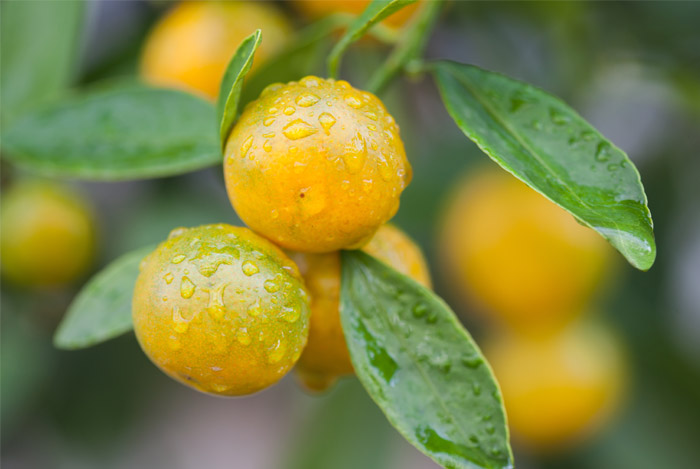
History
Unlike most fruits, you won’t be able to find oranges growing in the wilderness.
Perhaps that is why historians haven’t been able to exactly trace the history of the orange back to its origin.
Assumptions have been made that the orange originated in southern China, northeastern India, and southeastern Asia.
The word “orange” probably comes from the Sanskrit word “Nâraṅgaḥ”; after being modified from language to language, the English word “orange” was derived.
Oranges were first cultivated in India around 7,000 years ago and in China about 2500 BC.
Factors such as the development of Arab trade routes, the Roman conquests, and expansion of Islam in that era helped it spread across the surrounding region.
Persian traders introduced the Romans to oranges in the first century BC, who established orchards in North Africa in the first century AD.
When North Africa came under the Islamic Caliphate in the seventh century, trade relations with the Middle East were established, and oranges were introduced in that region.
In the eleventh century, oranges were being taken to Europe again, and Italian traders or Portuguese navigators took oranges to the Mediterranean region in the late fifteenth century or very early sixteenth century.
Before that time, citrus fruits were known in Europe only for their medicinal qualities, but after the orange was introduced, it became popular, and people who could afford it began growing it in private conservatories (1).
Spaniards introduced oranges to South America and Mexico in the 1500s, and the French may have introduced it in Louisiana.
There is also a possibility that Christopher Columbus planted orange seeds in Haiti in 1493.
Later expeditions planted orange trees in the New World.
Pedro Menéndez de Avilés brought oranges to Florida, Spanish missionaries brought them to Arizona, and Franciscans brought them to San Diego.
An orange orchard was established at the San Gabriel Mission around 1804, and a commercial orchard was opened near Los Angeles in 1841.
Oranges were grown in Hawaii starting in 1792 when Archibald Mendez gave plants to Hawaiian chiefs.
The Mediterranean fruit fly arrived in the 1900s and ruined cultivation (2, 3).
During the Age of Discovery, which lasted from the fifteenth to the eighteenth century, voyagers who spent a lot of time at sea became prone to scurvy due to a lack of vitamin C.
Because oranges are a rich source of vitamin C and have a long shelf life, these mariners planted orange trees along trade routes so that they could take oranges with them.
Oranges became well known and well loved across the world. Today, Brazil produces more oranges than any other country, mostly around São Paulo.
Brazil produces nearly one-third of all the oranges cultivated in the world.
The United States, China, and India are the next largest producers.
Mexico, Egypt, and Spain are also noteworthy for producing and exporting oranges (4).
Around 740,000 metric tons of oranges are produced annually around the world.

How Oranges Grow
You may have visited the grocery store or a farmer’s market to pick up fresh oranges.
Citrus fruits, including oranges, grow in tropical or subtropical climates.
Warm summers and mild winters allow them to thrive, whereas in colder climates the plants may not do well.
Summer temperatures from 55° to 100° Fahrenheit and winter temperatures from 35° to 50° Fahrenheit are best for growing them.
Certain varieties, however, especially sour oranges, may be more tolerant of cold temperatures than others.
Full-grown trees can bear up to ten hours in temperatures down to 25° Fahrenheit, while orange trees with fruit can bear temperatures of 27° Fahrenheit or below for around five hours.
Cold climates, though, aren’t really suitable because longer periods of exposure to cold can damage the branches and fruit.
If exposed to cold slowly, orange trees can develop some degree of endurance.
In areas where there is winter frost, varieties that ripen quickly, such as Skaggs Bonanza, can be planted (5).
Orange trees are evergreen, so they don’t lose their leaves in the fall or winter.
Different varieties ripen at different times of the year, so farmers in different regions cultivate accordingly.
For instance, Hamlin and Navel ripen from October to January; Pineapple, Sunstar, Midsweet, and Gardner ripen from December to March; and Valencias ripen from March to June.
Orange trees blossom for around seven months before bearing fruit, and can generally live up to seventy years (6).
Farmers can choose to grow orange trees from orange seeds, but they often take branches from successful orange trees and graft them onto disease-resistant rootstock.
Once an orange tree is established, it will bear fruit for up to seven years.
Most oranges are handpicked once they ripen, although some commercial growers use canopy shakers.
If left on the tree after ripening, an orange can remain for around three months, during which time the size or flavor may change a little.
Once picked, however, they stop ripening.

Varieties
Many varieties of oranges are available, but they can be classified as sweet or bitter.
Sweet oranges—thought to be a cross between a pomelo and a mandarin—are round with a soft rind and a sugary flavor.
The common orange is sweet, and one of the most popular varieties throughout the world is the Valencia orange.
Other well-known varieties are Hamlin, Jaffa, Marss, Parson Brown, Trovita, and Pineapple.
Another kind of sweet orange is the navel orange.
This variety has a smaller fruit growing at the blossom end of the main fruit, where it forms an indentation that resembles a human navel (thus its name).
The common types of navel orange are the Washington, Cara Cara, Bahia, Lane Late, Robertson, Skaggs Bonanza, and Spring.
The blood orange is also sweet and has a rich red hue (sometimes also pink or purple) because of higher levels of anthocyanins.
These oranges have a distinct berrylike flavor.
The best-known varieties are Moro, Sanguinelli, Maltese, and Tarocco.
Bitter oranges, on the other hand, don’t have skin as loose as those of sweet oranges.
Their rinds are harder, and they are usually not eaten fresh due to sourness from its acidic juices and bitterness from essential oils.
Bitter oranges are used to make marmalade.
Some popular varieties are Bouquet de Fleurs, Chinotto, and Seville (7, 8).
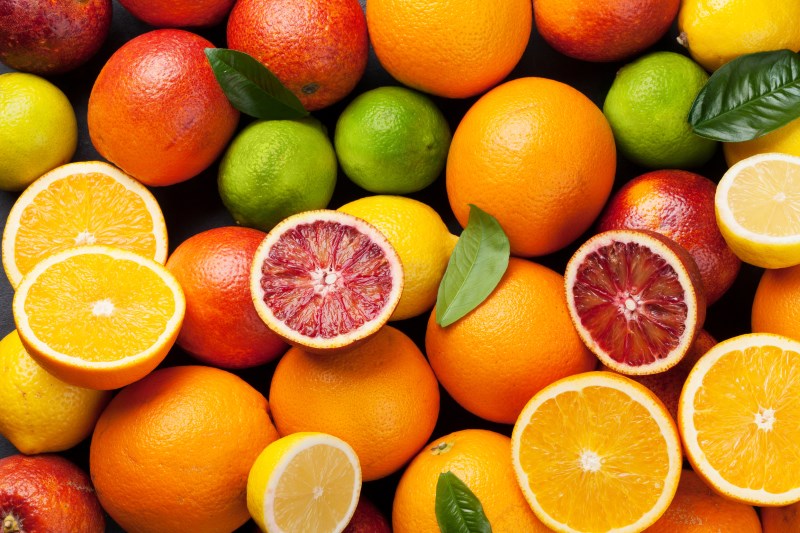
Interesting Facts
- The orange is, in fact, a type of berry called hesperidia.
- A type of orange known as the Bergamot is produced mainly to be used in cosmetics and flavoring.
- More than one orange plant can grow from just one orange seed.
- Orange is the third most preferred flavor in the world! It comes after chocolate and vanilla.
- Have you wondered whether the orange fruit was named after the color or the color named after the fruit? The latter is true since the word for the fruit comes from the Sanskrit word “naranga,” which is derived from the Tamil word “Naru,” meaning “fragrant.”
- Cornflakes are known for their fiber content, yet one medium-sized orange could give you the same amount of fiber as seven cups of cornflakes!
- An orange tree can bear up to sixty thousand flowers but only around six hundred of those will end up becoming oranges.
- In many cultures, oranges and their blossoms signify love. Sometimes they signify fertility because orange trees produce fruit, flowers, and foliage all at once.
- Valencia oranges can become green despite ripening because their peel can reabsorb chlorophyll in warm climates.
- Orange peels are versatile. They can be used to make candy or orange tea. They can be used as a home cleanser or to cut grease or oil as they do in Jamaica. Orange peel can be used as a medicine against anxiety, depression, or high blood pressure. It can help prevent bad breath, constipation, or respiratory problems. It can even help keep pesky slugs away from your garden! Because of its mildness, peels are often also used in skin care cosmetics and hair conditioners.
- Did you know that California once banned eating oranges while bathing because people believed the acid in oranges mixed with bath oils could become explosive?
- In 1911, Bobby Leach became the first man (but not the first person; a woman named Annie Taylor did it before him) to survive going over the Niagara Falls in a barrel. This feat is nothing short of amazing, but fifteen years later he died by slipping on an orange peel.
- In 2014, Marvel introduced a new superhero called “Captain Citrus” to help sell more 100% Florida Orange Juice.
- 85 percent of oranges produced in the world ends up being converted into juice.
- Pedicurists and manicurists use sticks made out of orange wood.
Oranges were once known as the fruit of gods. The “golden apples” that Hercules stole were actually oranges.
Nutritional Facts
Based on a diet of 2,000 calories, here are the nutritional components of one hundred grams of orange with their daily values.
General:
- Calories: 47
- Water: 87%
- Protein: 0.9 gram (1%)
- Carbohydrates: 11.8 grams (4%); 2.4 grams fiber (9%), and 9.4 grams sugar
- Fat: 0.1% (0%)
Vitamins and Minerals:
- Vitamin C: 88%
- Vitamin A: 4%
- Vitamin E: 1%
- Thiamine: 7%
- Riboflavin: 3%
- Niacin: 2%
- Pantothenic Acid: 5%
- Pyridoxine: 5%
- Folate: 8%
- Choline: 2%
- Calcium: 4%
- Iron: 1%
- Magnesium: 3%
- Phosphorus: 2%
- Potassium: 4%
- Zinc: 1%
- Copper: 4%
- Manganese: 1%
- Selenium: 1%
All these nutrients have their own individual role in keeping you healthy.
A peeled orange is typically heavier than a hundred grams, and if you have a couple each day or try the larger varieties, you can be one step closer to satisfying many of your nutritional requirements.
Health Benefits of Oranges
Oranges are far more than just delicious; they are packed with nutrients that can give you many health benefits.

Oranges and Vitamin C
Oranges are one of the best sources you can find for vitamin C.
This is a water-soluble vitamin that has many health benefits.
Because your body cannot produce vitamin C on its own, it is important that you eat fruits and vegetables that can provide it to you.
You can find vitamin C mainly in citrus fruits, berries, and green vegetables, such as kale and broccoli, but you don’t have to look much further from oranges because one small orange could provide up to 85 percent of your required daily value for vitamin C.
Since a vitamin C deficiency could cause many problems, e.g., easy bruising, slow wound healing, gingivitis, dry and splitting hair, dry and splotchy skin, nosebleeds, digestive disorders, high blood pressure, certain cancers, gallbladder diseases, and many more, eating oranges is a great way to avoid these problems and lead a healthy life.
Vitamin C can also help with improved physical performance, counteracting the side effects of certain drugs, and withdrawal in addiction (9).
Oranges and B Vitamins
Although B vitamins in oranges aren’t present in the same amount as vitamin C, they do provide a substantial portion of your daily needs.
In particular, vitamins B1, B2, B3, B5, and B6 are essential for our body to function smoothly.
They often work in tandem with each other, but each B vitamin helps maintain your health too.
For example, Thiamine (vitamin B1) helps produce new cells and break down carbs, Riboflavin (vitamin B2) helps in producing red blood cells and fighting free radicals.
Niacin (vitamin B3) helps boost the good HDL cholesterol, Pantothenic Acid (vitamin B5) helps produce sex and stress-related hormones and promotes healthy skin, and Pyridoxine (vitamin B6) helps regulate homocysteine levels and fights inflammation (10, 11, 12, 13, 14, 15, 16).
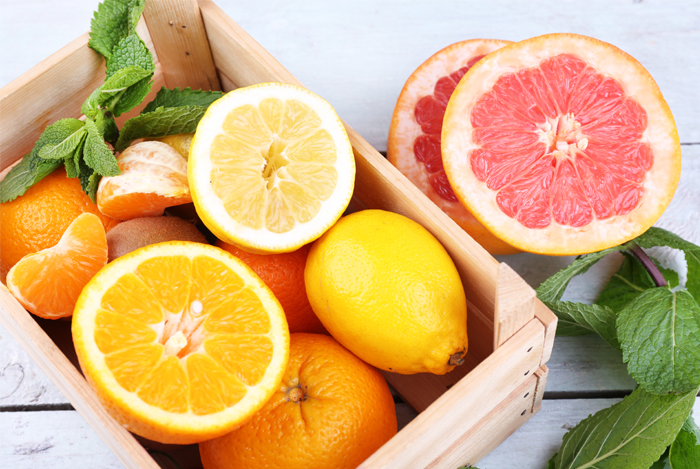
Oranges and Fiber
A large orange can usually supply around 18 percent of the recommended daily amount of fiber (17).
Some of the major fibers found in oranges are cellulose, hemicellulose, lignin, and pectin.
Dietary fiber in oranges is water-soluble but cannot be absorbed by the body.
It can help lower blood cholesterol and glucose levels (18).
A high-fiber diet can have many benefits, such as normalizing bowel movements, helping maintain healthy colons, and improving the overall health of the digestive system and the good bacteria in the intestines (19, 20, 21).
Fiber also promotes weight loss (22).
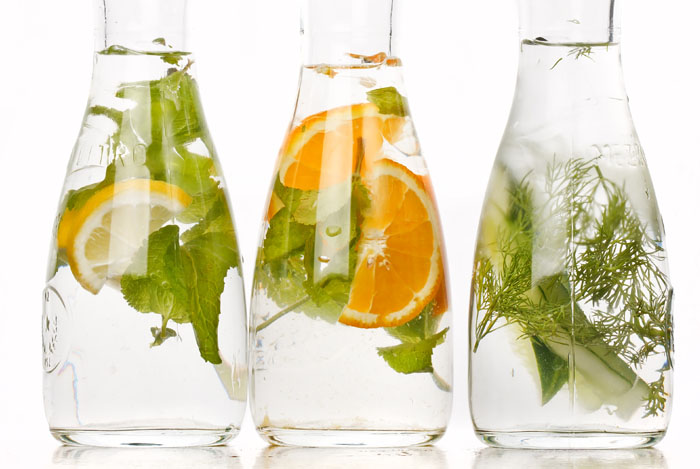
Oranges and Folate
Citrus fruits have among the highest concentration of folic acid compared with other foods.
For instance, one orange provides 50 mcg of folate.
If you have a large glass of orange juice, the folate content will be even higher, providing up to 19 percent of the daily value.
Folate is especially beneficial for pregnant women since it helps prevent birth defects related to the baby’s brain and spine, reducing risks by 50 percent to 70 percent.
Folate deficiency is associated with anemia, poor nutrient absorption, ulcerative colitis, and liver disease.
It is also used to fight against memory loss, age-related hearing loss, weak bones, restless leg syndrome, sleep problems, nerve pain, muscle pain, and AIDS (23, 24).
Folate is required for the human body to develop properly and produce DNA.
Oranges can be a wonderful addition to your diet to ensure a degree of protection against the above conditions.

Oranges and Antioxidants
The benefits of antioxidants are extremely important for your health, and you should try to consume as many antioxidants as possible.
Oranges are one beneficial source of antioxidants.
Vitamins C and the B are antioxidants as are the phenolics (particularly flavonoids) and carotenoids (25).
The flavonoid hesperidin protects from vascular conditions and other bodily damage, while the carotenoid beta-cryptoxanthin is converted to vitamin A by the body, and lycopene has many biological benefits (26, 27, 28).
Similarly, the anthocyanins and hydroxycinnamic acids are also important in battling the disease.
Antioxidants are also effective at preventing diseases because they reduce oxidative stress in the body that happens as a result of the accumulation of highly reactive chemicals called free radicals, which are linked to over sixty diseases, including cataracts, atherosclerosis, cancer, Parkinson’s disease, and Alzheimer’s.
Antioxidants also prevent inflammation and protect from radioactive damage.
Oranges give you natural antioxidant compounds, which is much more beneficial than taking individual antioxidant supplements (29).
Oranges and Bones Health
Strong bones are instrumental for your overall health since diminishing bone health leads to fatigue, digestive problems, weak immunity, and poor production of blood cells.
Without healthy bones, your body will struggle to support its own structure, and you may experience frequent fractures.
Weak bones will also inhibit you from doing everyday activities that require energy or strength.
It is well known that calcium, vitamin D, vitamin K, and even vitamin B12 help maintain bone health, but it is also true that vitamin C, which is abundant in oranges, is important (30).
A study conducted on mice has revealed that vitamin C deficiency leads to low bone mineral density (31).
Since high levels of homocysteine have been linked with low mineral density and bone turnover, too, vitamin B6 also contributes to bone health.

Oranges and Immunity
Your immune system is crucial for your health.
Without proper immunity, you become susceptible to many diseases and infections.
Your body will no longer be able to stave off the illnesses that come from germs, bacteria, pollutants, and mutations.
Vitamin C is a powerful immune booster.
It can provide the body with the nourishment to equip itself with the ability to prevent diseases and can strengthen the immune system by detoxifying the body and healing tissues, leading to decreased prevalence of chronic degenerative processes (32).
It can also prevent pathogens and free radicals from entering the body, keeping it sharp and healthy.
High concentrations of free radicals in the body can severely impair the immune system by damaging tissues.
The antioxidants in oranges provide the oxidative balance that ensures healthy tissues and a well-functioning immune system (33, 34).
The thiamine in orange is also very effective in strengthening the immune system and enabling the body to protect itself from foreign bodies (35, 36).
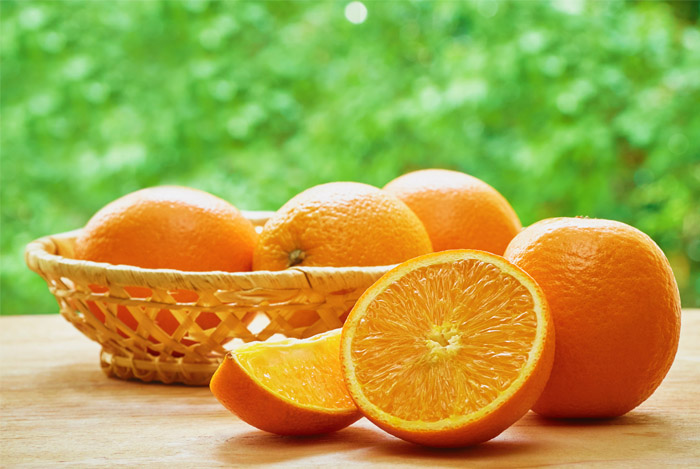
Oranges and Liver Health
The liver is among the body’s largest and most vital organs.
It performs hundreds of functions and is crucial for the detoxification process.
It filters over one liter of blood per minute, so it is always fast at work.
It also produces bile, produces and breaks down various hormones, regulates blood sugar, produces proteins (blood proteins, clotting proteins, lipoproteins), and much of the body’s cholesterol.
If your body were to stop functioning, you wouldn’t be able to survive for more than a few hours.
Considering just how significant your liver’s health is to your well-being — and your survival, really — you should be eating as much of those foods that protect it as you can.
Oranges are the perfect food since their vitamin C content is effective against liver cirrhosis (37).
They also help fight fatty liver disease (38).
A study on diabetic rats has shown that vitamin C assists the liver by removing toxic wastes from the blood (39).
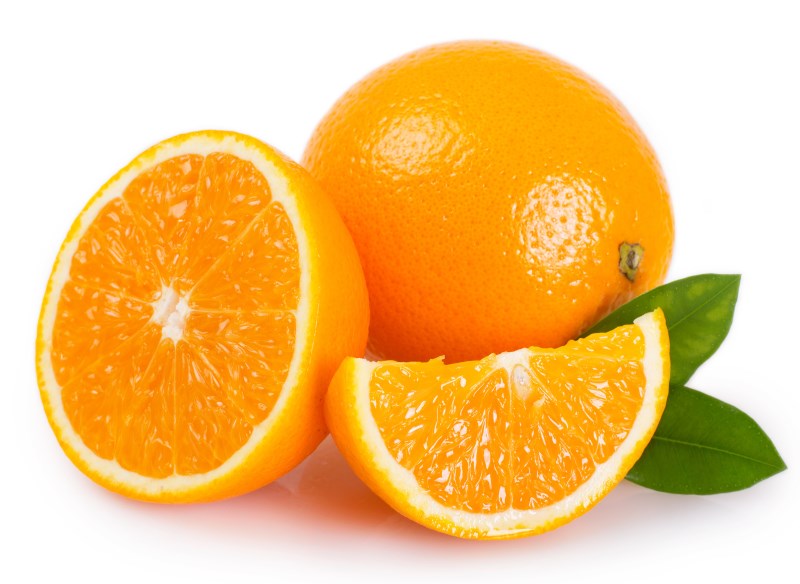
Oranges and Your Mood
Nearly everyone has been in a bad mood at various points in their life, which could be because of a number of reasons, such as pressure in the workplace or your social life, inadequate exercise, or a poor diet.
Eating healthy fruits, such as oranges, is definitely important because it can help your body replenish itself and regenerate your good mood, which can help you perform much better in all aspects of your life.
The brain hormone serotonin is essential for mood enhancement.
In the process of creating serotonin, vitamin C has to be present so that tryptophan can be converted to 5-hydroxytryptophan (40).
A study has shown that a deficiency of vitamin C lowers emotional states while adding it to the diet rapidly improves mood (41).
Oranges can be effective for depression patients for this reason.
Folate has also been shown to help with depression — of the perinatal kind.
Expectant women or those who’ve just given birth can’t usually have regular medication for depression for the sake of the child’s health, but folate is a safe way to enhance mood during that period (42).
Oranges and Gums
Not only are healthy gums by themselves important, but they can also help the rest of your body to be healthy.
Without strong gums, you are going to experience discomfort in your mouth, possibly with frequent bleeding, pain, or sensitivity.
Weak gums also can’t properly prevent bacteria from affecting your teeth and releasing toxins that can eat away at your gums and teeth.
Researchers believe that unhealthy gums can also cause cardiovascular diseases by allowing entry to oral bacteria that can attach to plaque and obstruct blood flow and respiratory infections when oral bacteria is inhaled into the lower respiratory tract (43).
Oranges, which have such a nice mix of antioxidants, are great at protecting the gums and ensuring that they remain healthy and able to protect against unwanted bacteria (44).

Oranges and Heart/Blood Vessels
Your heart and blood vessels are responsible for the very things that directly support life.
Your heart pumps types of blood, and your vessels transport oxygenated blood to all your organs and deoxygenated blood away to be filtered, and ensure that all the organs, tissues, and cells in your body are functioning well.
You know how by giving you healthy gums, oranges can help against heart diseases (45).
Hesperidin and other such flavonoids found in oranges also protect vascular health by decreasing diastolic blood pressure and increasing microvascular reactivity (46, 47).
Orange juice can also help by thinning your blood (48).
Similarly, isolated fibers from citrus fruits, such as oranges, have been shown to decrease blood cholesterol levels (49).
The American Heart Association has found that eating citrus fruits might reduce the risk of ischemic stroke for women by up to 19 percent (50).
Another study showed that people consuming 4,069 mg of potassium, which is also present in oranges, had a 49 percent lower risk of ischemic heart disease (51).
Oranges and Vision
Surviving without proper vision is tough.
Your sense of vision is a major factor in how you go about your everyday life, and having it diminish will be both uncomfortable and unsafe for you.
Your brain often has to make decisions based on visual stimuli; when your vision itself is impaired, it can become difficult.
Especially as you grow older, you will be vulnerable to weakening eyes.
For people over 55, macular degeneration is the most common cause of blindness, and the number of people suffering from it is expected to triple by 2025.
Vitamin C supports the blood vessels in the eye and is present in all eye tissues.
It can drastically decrease risks of or delay cataracts as well as AMD and visual acuity loss (52, 53).
Orange juice also has vitamin A, which helps with night vision and AMD (54).
Finally, studies have also demonstrated that folate can effectively fight AMD (55).
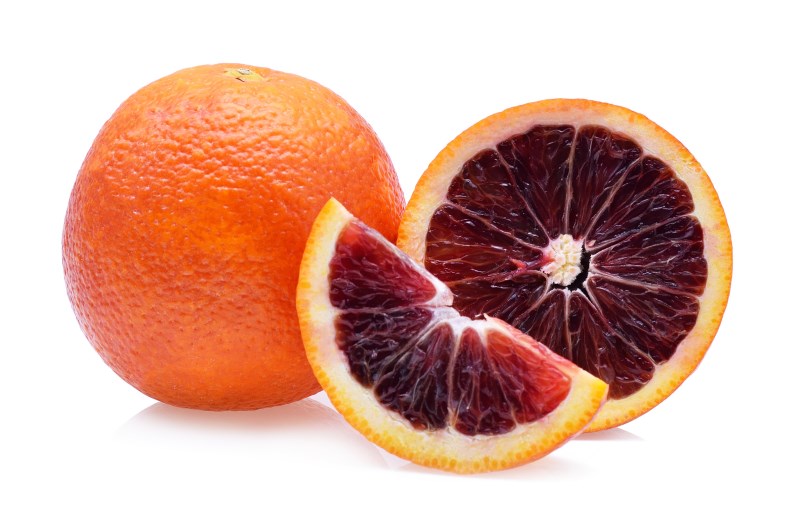
Oranges and Cancer
Cancer is caused by abnormal cell growth and is fast becoming more and more common across the world.
It is invasive, often painful, and expensive to treat.
Furthermore, it is often fatal if undetected until its later stages or if not stopped by chemical or radioactive treatment.
Aside from avoiding pollutants, it is also really important to have enough nourishment so that your body can fight against cancer before it becomes a problem.
Since oranges have lots of antioxidants, they are great at helping prevent cancer as well as a recurrence of cancer after therapy (56).
Hesperidin has been linked with reducing tumor growth and promoting the death of cancerous cells (57).
Since too many free radicals can also cause cancer, vitamin C and other antioxidants present in oranges can help prevent this disease.
Several studies have shown the importance of antioxidants in preventing and battling the growth of cancerous tumors (58).
Similarly, the fiber content of oranges can help prevent colorectal cancer by keeping the digestive system healthy.
Oranges and Kidney Stones
The small, hard mineral deposits inside your kidneys known as kidney stones can cause severe pain or difficulties if they move or pass to the ureter.
These can range from murky urine to pain in the abdominal area to infections to nausea and vomiting.
There is often pain involved in passing kidney stones, and surgery is sometimes required.
Oranges are a rich source of citric acid and citrates, which can prevent kidney stone formation (59, 60).
By eating oranges or drinking orange juice, you can greatly avoid the risk of forming stones.

Oranges and Cholesterol
Regarding cholesterol, think of the two types this way: low-density lipoprotein is the “bad” cholesterol, and high-density lipoprotein is the “good” cholesterol.
Too much LDL and inadequate HDL might cause plaque to build up in your arteries and lead to a heart attack or stroke, depending on whether the blocked arteries are carrying blood to the heart or the brain.
The buildup of plaque can also restrict blood flow to your limbs, causing peripheral arterial disease and increasing the risk of infections in those areas or even gangrene.
High cholesterol can also lead to the formation of gallstones or cause the intestinal ischemic syndrome, characterized by abdominal pain, nausea, vomiting, and bloody stools.
Oranges have been shown to increase HDL levels and lower LDL levels (61).
Certain studies have found that fiber can also effectively reduce LDL cholesterol (62, 63, 64).
One study has shown that due to reduced homocysteine levels folic acid can contribute to balanced cholesterol levels (65).
Oranges and Blood Pressure
Blood pressure is directly related to your health.
You want your blood pressure to be stable and not too high or too low.
High blood pressure is generally more dangerous since it can put a strain on your arteries and heart.
The walls of your arteries can become thick and inflexible, making the passage itself narrower and more likely to clog up.
A clot can lead to heart attacks, strokes, dementia, or kidney problems.
It could also lead to your arteries bursting.
Hesperidin in oranges can decrease diastolic blood pressure if oranges are consumed regularly over time (66).
Oranges also have potassium, which can dilate arteries and thus be effective in managing blood pressure (67).

Oranges and Inflammation
Inflammation is characterized by parts of the body becomes red, swollen, hot, and often painful.
This usually happens as a response to infection or injury, but a diet high in fat or sugars can also lead to inflammation.
This can then cause an increase in insulin resistance, often leading to type 2 diabetes or atherosclerosis.
Citrus fruits, such as oranges, are widely regarded as anti-inflammatory agents.
Orange juice can neutralize the inflammatory effects of the high fat or high sugar diet (68).
By protecting you from inflammation, you can help prevent diabetes and protect your heart.
Oranges and Skin Health
Skin health is important for your appearance because how you look can affect your self-esteem, how you perform in your professional or social life, and also how people respond to you.
Your skin also performs many essential tasks, such as protecting your body from viruses and bacteria as well as UV radiation.
Skin conditions may also lead to a problem in balancing bodily temperatures or in your skin’s sensitivity, which is important for your brain to make decisions based on touch-based stimuli.
A study has found that higher vitamin C levels had an inverse relation with skin wrinkling, dryness, and aging (69).
It contributes to collagen synthesis, keeping your skin firm and elastic.
The antioxidants in oranges also protect the body from skin inflammation and sun damage from UV rays (70).
Niacin is great for preventing acne (71).
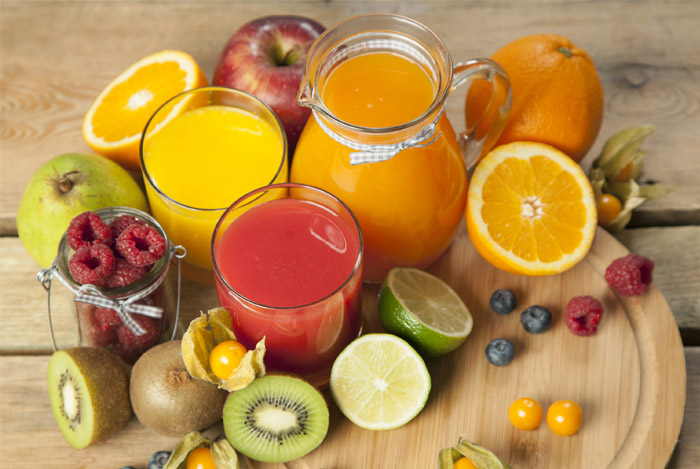
Oranges and Diabetes
You already know that oranges can help prevent type 2 diabetes.
Diabetes is truly a struggle for patients because it affects almost all the different systems of the body.
It can take a toll on various organs, such as the kidneys, eyes, blood vessels, nerves, gums, and teeth.
Long-term effects include heart attacks, strokes, kidney problems, and damage to blood vessels.
Fiber effectively battles diabetes; it can improve blood glucose levels for type 1 diabetics and improve blood sugar, lipid, and insulin levels for type 2 diabetics.
If you’re accustomed to meals high in carbohydrates, fibrous foods with a low glycemic index, such as oranges, help you avoid large spikes in blood sugar after such meals (72, 73, 74).
Oranges and Weight Loss
Weight not only affects your appearance but also your health.
Being overweight may hinder opportunities in the workplace or in your social or personal strata and might cause unhappiness and even depression due to low self-esteem.
Obesity rates have skyrocketed in recent years, which is a testimony to poor nutrition and lack of exercise for many people today.
Being overweight or obese can increase risks for heart diseases, diabetes, some types of cancer, osteoarthritis, and back pain.
Fiber can increase satiety by binding water in the intestine and slowing down the absorption of nutrients (75, 76, 77).
This helps you avoid unhealthy snacking or overeating.
Studies indicate that a diet high in fiber, which can be achieved by consuming more oranges, can substantially help with weight loss (78, 79, 80).
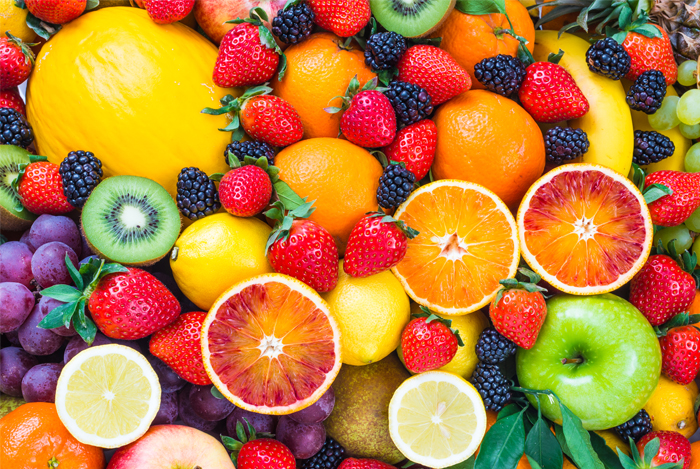
Oranges and Digestion
Your gastrointestinal system is crucial to your overall health.
Your digestive health is very closely linked with your immune system.
The digestive tract is involved in the absorption of all food nutrients that will then help fuel and protect your body from diseases.
Problems in your digestive tract may also affect your cognition and mood, according to some recent studies (81).
What is more, an estimated 90 percent of serotonin is produced in the digestive tract rather than in the brain (82).
Fibers function as prebiotics, keeping the healthy bacteria in the gut alive and healthy (83, 84).
These bacteria perform a range of functions, including producing additional nutrients for the body, such as short-chain fatty acids (85).
These fatty acids, in turn, reduce inflammation in the gut and help alleviate the severity of such digestive diseases as irritable bowel syndrome, Chron’s disease, and ulcerative colitis (86, 87, 88).
Likewise, folate has been shown to help prevent colorectal cancer (89).

Oranges and Gout
Arthritis is uncomfortable and often painful, but gout is especially severe.
It occurs when too much uric acid builds up in the body.
It can cause pain, swelling, redness, heat, and stiffness in joints.
It usually starts with the big toe for most people but can occur in other joints, such as the insteps, ankles, heels, knees, wrists, fingers, and elbows.
Factors such as diets high in fructose, drinking too much alcohol, certain foods, and medicines, and certain diseases and conditions will increase the likelihood of gout attacks, which can last up to ten days.
A longitudinal study with 46,994 male participants showed that those with a higher vitamin C intake had a consistently lower chance of developing gout (90).
Other studies have also shown a strong inverse relationship between vitamin C and a decrease in uric acid levels, which helps prevent gout (91, 92, 93, 94).
Oranges and Brain
Heart health and physical fitness are certainly important, but keeping your brain sharp and healthy is as well.
After age thirty, your brain’s cognitive functions will begin to slowly dwindle, but by eating right, exercising, and limiting stress, you can keep your brain young even in old age.
Once again, the vitamin C in oranges is particularly helpful against cognitive decline.
With its role as an antioxidant, a neuromodulator, and a contributor to collagen synthesis, vitamin C has an integral role in the brain, especially because it can reverse damage from oxidative stress, which causes brain cells to age.
It can keep you alert and prevent the onset of neurodegenerative diseases, such as dementia, Alzheimer’s, and Parkinson’s.

Oranges and Pregnancy
If you’re a to-be mother or are thinking about having children in the future, you must be concerned about ensuring proper health for both you and your child.
You would want your pregnancy to go as smoothly as possible and your child to be born healthy and strong.
By eating the right foods during pregnancy, you can provide the baby with the nourishment it needs to develop properly and come into the world without defects or health conditions.
Folate is quite important for proper fetal development.
A deficiency in early stages of pregnancy can cause neural tube defects, which can lead to spina bifida or a need for termination, while an increase in intake can decrease chances by 50 percent (95, 96).
It can also reduce the chances of anencephaly by 70 percent and prevent preeclampsia and early labor.
Many times defects occur inadvertently before a woman learns she is pregnant and takes precautions.
A healthy amount of folate in the diet can help prevent those from happening (97, 98, 99, 100).
Oranges and Fertility
If you may have been actively trying to conceive without success for a year or more, your problem might be because of fertility problems.
These could result from complications of either or both the woman’s and man’s reproductive systems.
If the problem seems to be with the latter, oranges are noteworthy for improving sperm viability.
Studies have linked folate to improved sperm health and function (101).
A folate deficiency in men can cause the development of sperm cells with incorrect chromosomal structure, which inhibits fertility (102).
A study with infertile males showed that consuming foods with folate helps improve sperm motility and resolve the problem of infertility (103).
Since oranges are a good source of folate, eating them regularly could help avoid any difficulties that may arise when trying to conceive.
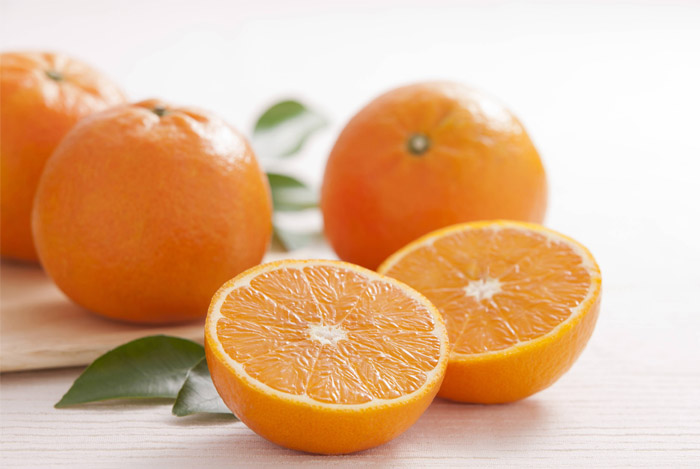
How to Buy and Store
Today, modern methods of cultivation allow you to buy oranges year-round, but those available during normal harvesting seasons usually taste the best and have fewer chemicals or less coloring.
When buying oranges, choose those that have a deep, rich color.
If an orange is pale, has spots, or is too soft, stay away from it.
A nice, tasty orange will be firm, have smooth skin, and be heavy with juice.
To test whether or not an orange is fresh, take a sniff.
If it smells fragrant and citrusy, you’re good to go.
If on the other hand, it smells sour, it is nearing the end of its shelf life.
An orange that is not fresh will be dry and sour on the inside (104).
If you store oranges at room temperature, they will be good for around a week.
After that time, mold will start to grow and spoil the inside.
If you store oranges in a refrigerator, they will last for around two to four weeks.
You can try using wax paper to keep out moisture.
Once you’ve removed the peel or cut an orange, you no longer have the protection that the natural covering provides.
You should seal it with a wrap and keep in an airtight food container so that it remains fresh for a longer time (105, 106).
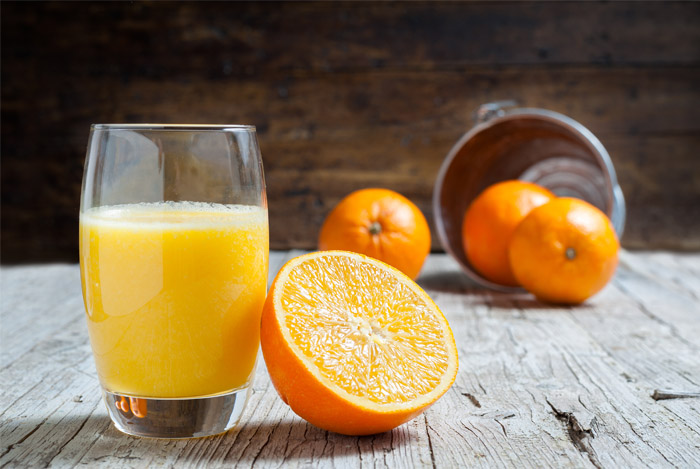
How to Add More Oranges into Your Diet
If you try to eat more oranges, you’ll fall into the habit of including them in your regular diet.
Carry an orange or two when you leave for work or school.
Replace the junk foods in your house with oranges.
Keep them in the refrigerator or a fruit bowl so that the next time you have a craving you can have an orange instead of ice cream.
Replace the soda or preservative-filled juices in your home with fresh orange juice.
If you feel like experimenting in the kitchen, a lot of dishes (both sweet and savory) use oranges, orange zest, or orange juice.
Give those recipes a try — you may be pleasantly surprised.
Prepare more healthy fruit salads or yogurt salads, and use slices of orange in them.
You can add some orange pieces to your breakfast cereal or breakfast food, such as oatmeal, pancakes, or waffles.
By taking these small steps to add more oranges to your diet, you will be doing your mind and body a huge favor.
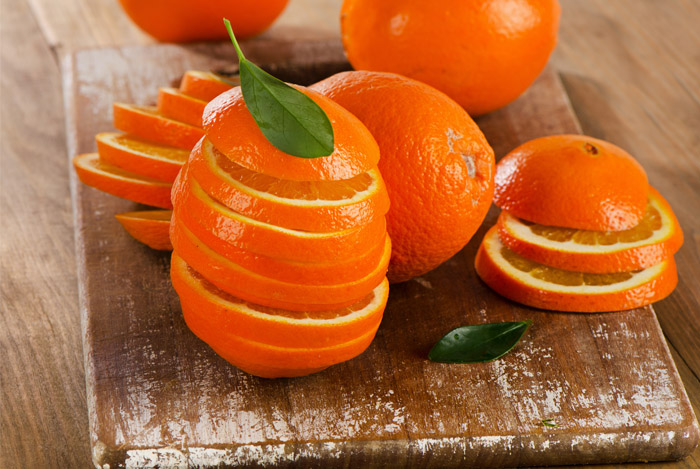
Precautions
Regarding oranges, you don’t have to take too many precautions.
Some people may be allergic to them, but this is very rare.
For young children, consuming too much orange peel can be dangerous, causing colic, convulsions, and even death.
Note that only the peel, not the juice or the pulp that has this effect.
People who suffer from heartburn may want to avoid oranges because of their vitamin C content, which can worsen symptoms.
Otherwise, oranges are perfectly safe to eat (107).
Conclusion
Oranges are clearly very effective in helping prevent various diseases.
This delicious, pulpy fruit is enjoyed around the world and should definitely be included in your diet.
FDA Compliance
The information on this website has not been evaluated by the Food & Drug Administration or any other medical body. We do not aim to diagnose, treat, cure or prevent any illness or disease. Information is shared for educational purposes only. You must consult your doctor before acting on any content on this website, especially if you are pregnant, nursing, taking medication, or have a medical condition.
HOW WOULD YOU RATE THIS ARTICLE?



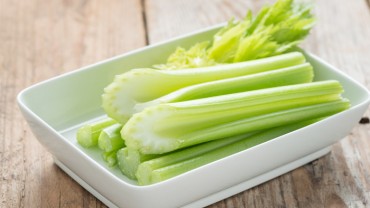



How many oranges a day should I eat to see weight loss effect? Do I have just add them to my daily menu or make some other changes?
Thank you for the article! Though I have a question regarding the benefits of oranges for the people with diabetes. Oranges do really have fiber which is good but they are also high in sugar. Isn’t this bad for people struggling with diabetes?
I just adore oranges! Every morning I drink freshly squeezed orange juice but, maybe, I shouldn’t drink it so often?
Can my habit cause any health problems?
I know the peels of oranges also have many benefits. I would like to get them but I don’t know how to use peels, cook them or so…Can you advise anything?
Thanks for sharing these amazing Health Benefits..
I really love Oranges
Fabulous research on oranges! So very thorough. Thank you very much! I love oranges and can’t seem to get enough of them lately. They are delicious!
Thank You Sir, for representing this kind of information. But if you more explain how orange fight against cancer so I will thankful to you.